FACT SHEET 1 - THE FIRST SITTING OF THE NATIONAL ASSEMBLY
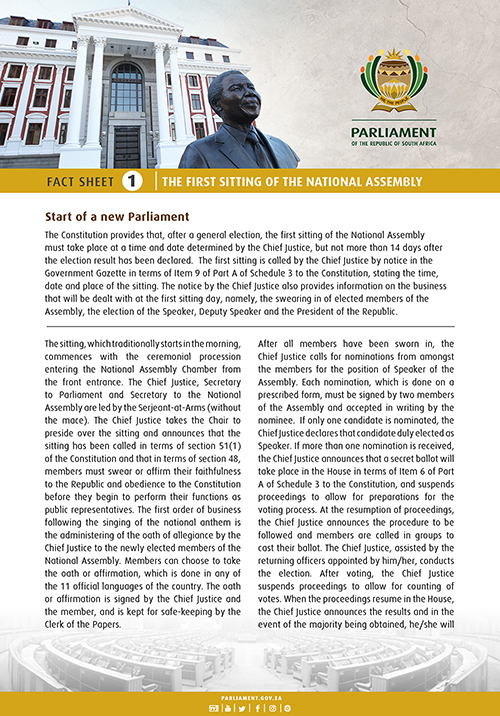 The Constitution provides that, after a general election, the first sitting of the National Assembly must take place at a time and date determined by the Chief Justice, but not more than 14 days after the election result has been declared. The first sitting is called by the Chief Justice by notice in the Government Gazette in terms of Item 9 of Part A of Schedule 3 to the Constitution, stating the time, date and place of the sitting.
The Constitution provides that, after a general election, the first sitting of the National Assembly must take place at a time and date determined by the Chief Justice, but not more than 14 days after the election result has been declared. The first sitting is called by the Chief Justice by notice in the Government Gazette in terms of Item 9 of Part A of Schedule 3 to the Constitution, stating the time, date and place of the sitting.
Read more
FACT SHEET 2 - THE ROLE OF PRESIDING OFFICERS
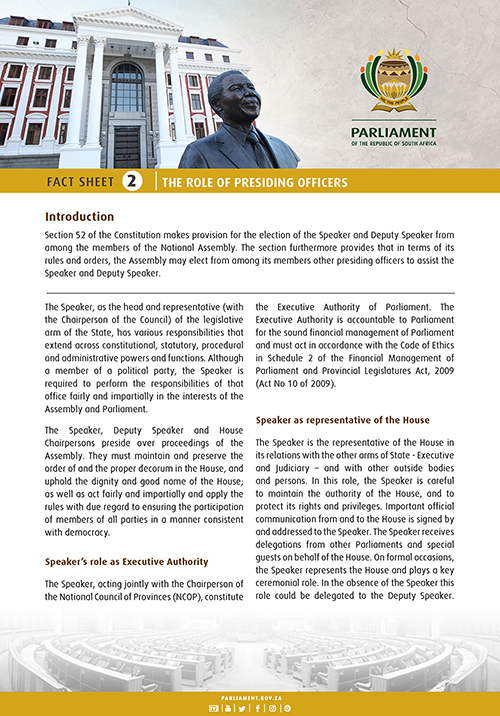 Section 52 of the Constitution makes provision for the election of the Speaker and Deputy Speaker from among the members of the National Assembly. The section furthermore provides that in terms of its rules and orders, the Assembly may elect from among its members other presiding officers to assist the Speaker and Deputy Speaker.
Section 52 of the Constitution makes provision for the election of the Speaker and Deputy Speaker from among the members of the National Assembly. The section furthermore provides that in terms of its rules and orders, the Assembly may elect from among its members other presiding officers to assist the Speaker and Deputy Speaker.
Read more
FACT SHEET 4 - RULES OF THE NATIONAL ASSEMBLY
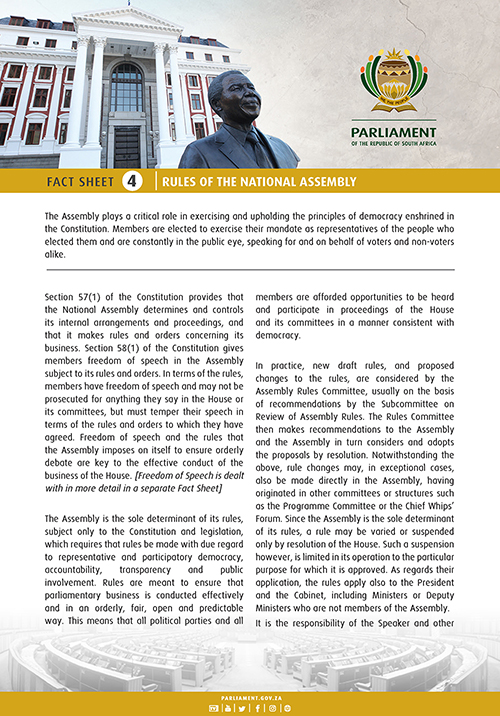 The Assembly plays a critical role in exercising and upholding the principles of democracy enshrined in the Constitution. Members are elected to exercise their mandate as representatives of the people who elected them and are constantly in the public eye, speaking for and on behalf of voters and non-voters alike.
The Assembly plays a critical role in exercising and upholding the principles of democracy enshrined in the Constitution. Members are elected to exercise their mandate as representatives of the people who elected them and are constantly in the public eye, speaking for and on behalf of voters and non-voters alike.
Read more
FACT SHEET 5 - FREEDOM OF SPEECH
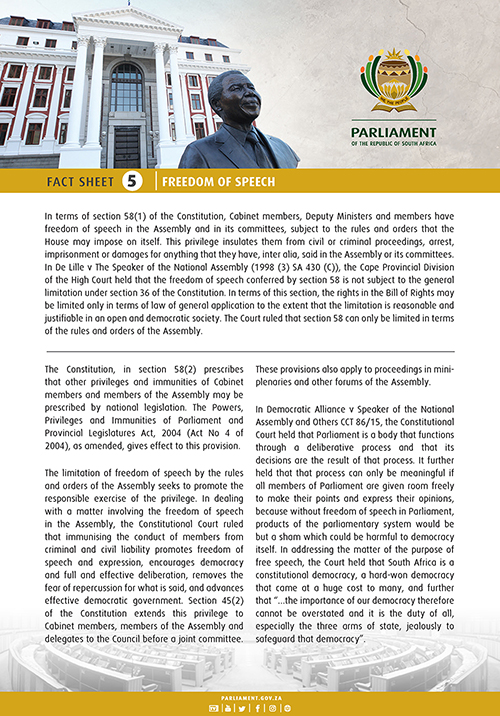 In terms of section 58(1) of the Constitution, Cabinet members, Deputy Ministers and members have
freedom of speech in the Assembly and in its committees, subject to the rules and orders that the House may impose on itself. This privilege insulates them from civil or criminal proceedings, arrest, imprisonment or damages for anything that they have, inter alia, said in the Assembly or its committees.
In terms of section 58(1) of the Constitution, Cabinet members, Deputy Ministers and members have
freedom of speech in the Assembly and in its committees, subject to the rules and orders that the House may impose on itself. This privilege insulates them from civil or criminal proceedings, arrest, imprisonment or damages for anything that they have, inter alia, said in the Assembly or its committees.
Read more
FACT SHEET 6 - DECORUM IN THE HOUSE
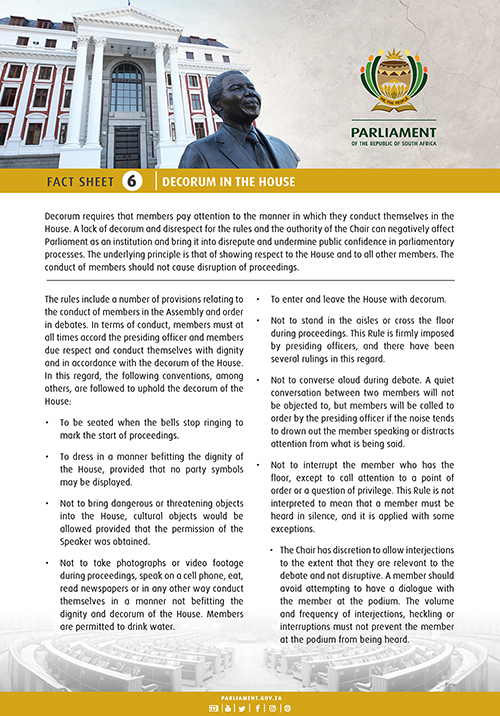 Decorum requires that members pay attention to the manner in which they conduct themselves in the
House. A lack of decorum and disrespect for the rules and the authority of the Chair can negatively affect Parliament as an institution and bring it into disrepute and undermine public confidence in parliamentary processes. The underlying principle is that of showing respect to the House and to all other members. The conduct of members should not cause disruption of proceedings.
Decorum requires that members pay attention to the manner in which they conduct themselves in the
House. A lack of decorum and disrespect for the rules and the authority of the Chair can negatively affect Parliament as an institution and bring it into disrepute and undermine public confidence in parliamentary processes. The underlying principle is that of showing respect to the House and to all other members. The conduct of members should not cause disruption of proceedings.
Read more
FACT SHEET 7 - ORDER IN PUBLIC MEETINGS AND RULES OF DEBATE
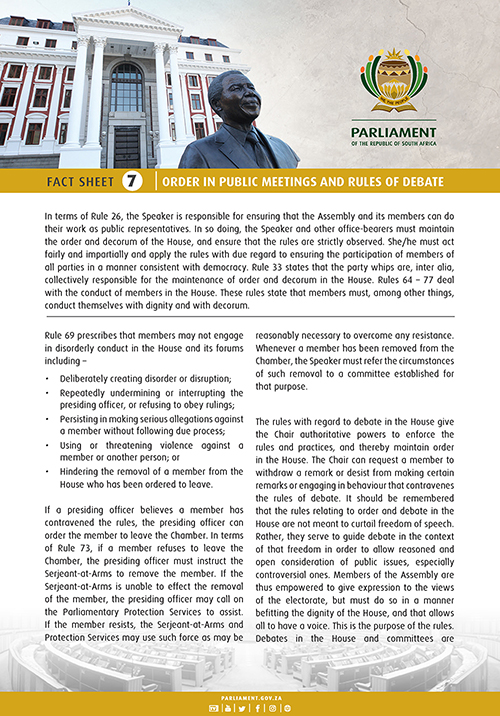 In terms of Rule 26, the Speaker is responsible for ensuring that the Assembly and its members can do their work as public representatives. In so doing, the Speaker and other office-bearers must maintain the order and decorum of the House, and ensure that the rules are strictly observed. She/he must act fairly and impartially and apply the rules with due regard to ensuring the participation of members of
all parties in a manner consistent with democracy. Rule 33 states that the party whips are, inter alia, collectively responsible for the maintenance of order and decorum in the House.
In terms of Rule 26, the Speaker is responsible for ensuring that the Assembly and its members can do their work as public representatives. In so doing, the Speaker and other office-bearers must maintain the order and decorum of the House, and ensure that the rules are strictly observed. She/he must act fairly and impartially and apply the rules with due regard to ensuring the participation of members of
all parties in a manner consistent with democracy. Rule 33 states that the party whips are, inter alia, collectively responsible for the maintenance of order and decorum in the House.
Read more
FACT SHEET 8 - MOTIONS
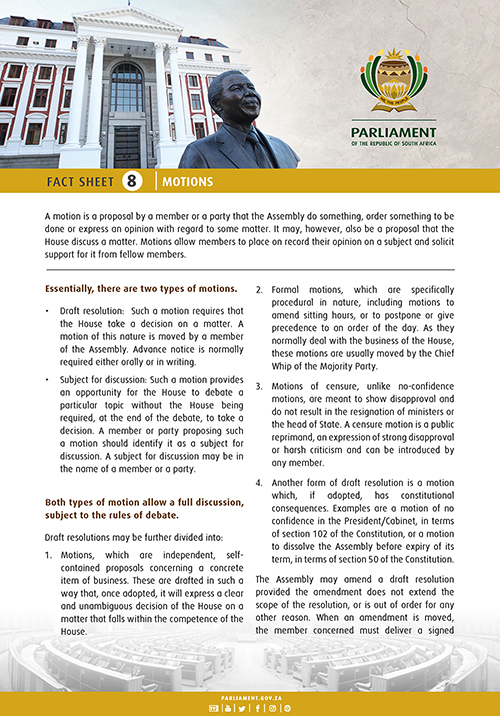 A motion is a proposal by a member or a party that the Assembly do something, order something to be done or express an opinion with regard to some matter. It may, however, also be a proposal that the House discuss a matter. Motions allow members to place on record their opinion on a subject and solicit support for it from fellow members.
A motion is a proposal by a member or a party that the Assembly do something, order something to be done or express an opinion with regard to some matter. It may, however, also be a proposal that the House discuss a matter. Motions allow members to place on record their opinion on a subject and solicit support for it from fellow members.
Read more
FACT SHEET 9 - MEMBERS’ STATEMENTS, EXECUTIVE STATEMENTS AND URGENT MATTERS OF NATIONAL PUBLIC IMPORTANCE
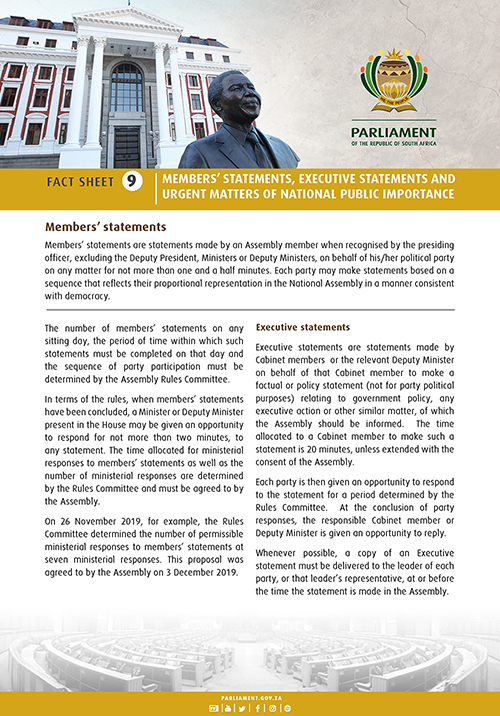 Members’ statements are statements made by an Assembly member when recognised by the presiding
officer, excluding the Deputy President, Ministers or Deputy Ministers, on behalf of his/her political party on any matter for not more than one and a half minutes. Each party may make statements based on a sequence that reflects their proportional representation in the National Assembly in a manner consistent
with democracy.
Members’ statements are statements made by an Assembly member when recognised by the presiding
officer, excluding the Deputy President, Ministers or Deputy Ministers, on behalf of his/her political party on any matter for not more than one and a half minutes. Each party may make statements based on a sequence that reflects their proportional representation in the National Assembly in a manner consistent
with democracy.
Read more
FACT SHEET 10 - HANSARD
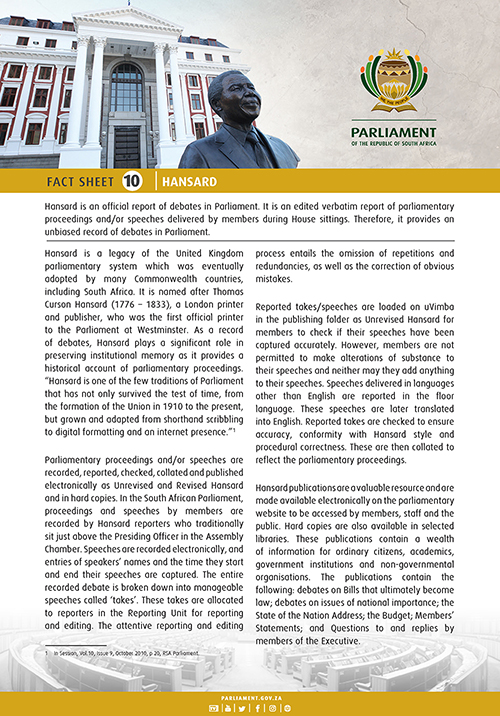 Hansard is an official report of debates in Parliament. It is an edited verbatim report of parliamentary proceedings and/or speeches delivered by members during House sittings. Therefore, it provides an unbiased record of debates in Parliament.
Hansard is an official report of debates in Parliament. It is an edited verbatim report of parliamentary proceedings and/or speeches delivered by members during House sittings. Therefore, it provides an unbiased record of debates in Parliament.
Read more
FACT SHEET 11 - GLOSSARY OF PARLIAMENTARY TERMS
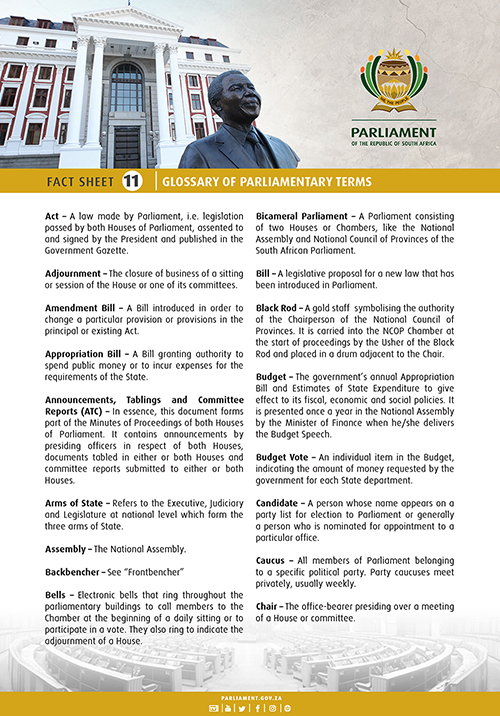 Act – A law made by Parliament, i.e. legislation passed by both Houses of Parliament, assented to
and signed by the President and published in the Government Gazette.
Act – A law made by Parliament, i.e. legislation passed by both Houses of Parliament, assented to
and signed by the President and published in the Government Gazette.
Bicameral Parliament – A Parliament consisting of two Houses or Chambers, like the National Assembly and National Council of Provinces of the South African Parliament.
Read more

